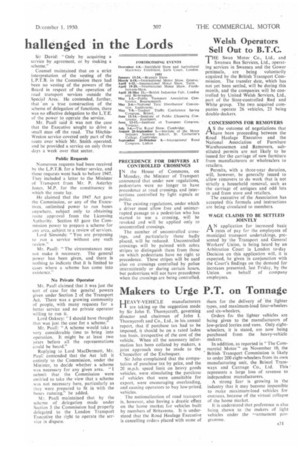hallenged in the Lords
Page 33

If you've noticed an error in this article please click here to report it so we can fix it.
Sir David: "Only by acquiring a service by agreement, or by making a scheme."
Counsel maintained that on a strict interpretation of the vesting of the L.P.T.B. in the Commission there had been no vesting of the powers of the Board in respect of the operation of road transport services outside the Special Area He contended, further, that on a true construction of the scheme a delegation of functions, there was no effective delegation to the L.T.E. of the power to operate the service.
Mr. Paull said it was not the case that the Executive sought to drive a small man off the road. The HitchinWeston service covered only part of the route over which Mr. Smith operated. and he provided a service on only three days a week over that sector.
Public Requests
Numerous requests had been received by the L.P.T.B. for a better service, and those requests went back to before 1947. "(hey included a letter to the Minister of Transport from Mr. P. Asterley Jones, M.P. for the constituency in NvIlich the route lay.
He claimed that the 1947 Act gave the Commission, or any of the Executives. unlimited power to run buses anywhere. subject only to obtaining route approval from the Licensing Authority. Section 63 gave the Commission power to prepare a scheme for any area. subject to a review of services.
Lord Simonds: "You are proposing to run a service without any such review."
Mr. Paull: "The circumstances may not make it necessary. The general power has been given, and there is nothing to indicate that it is limited to cases where a scheme has come into existence."
No Private Operator Mr. Paull claimed that it was just the sort of case for the general powers given under Section 2 of the Transport Act. There was a growing community of people, with many requests for a better service and no private operator willing to run it, Lord Oaksey: "I should have thought that was just. the case for a scheme."
Mr. Paull: "A scheme would take a very considerable time to bring into operation. It might be at least two years before all the representations could be heard."
Replying to Lord MacDermott, Mr. Paull contended that the Act left it entirely to the Commission, under the Minister, to decide whether a scheme was necessary for any given area. "I submit that the Commission were entitled to take the view that a scheme was not necessary here, particularly as they were prepared to fit in with the buses running," he added.
Mr. Paull maintained that by the scheme of delegation made under Section 5 the Commission had properly delegated to the London Transport Executive the right to operate the service in dispute.
PRECEDENCE FOR DRIVERS AT CONTROLLED CROSSINGS IN the House of Commons, on 1 Monday, the Minister of Transport announced that under new regulations, pedestrians were no longer to have precedence at road crossings and intersections controlled by light signals or police.
The existing regulations, under which a driver must allow free and uninterrupted passage to a pedestrian who has started to use •a crossing, will be revoked and will be applied only to uncontrolled crossings.
The number of uncontrolled crossings, and particularly those badly placed, will be reduced. Uncontrolled crossings will be painted with zebra stripes to distinguish them from those on which pedestrians have no right to precedence. These stripes will be used also on crossings controlled by police intermittently or during certain hours, but pedestrians will not have precedence when the crossings are being controlled.












































































































